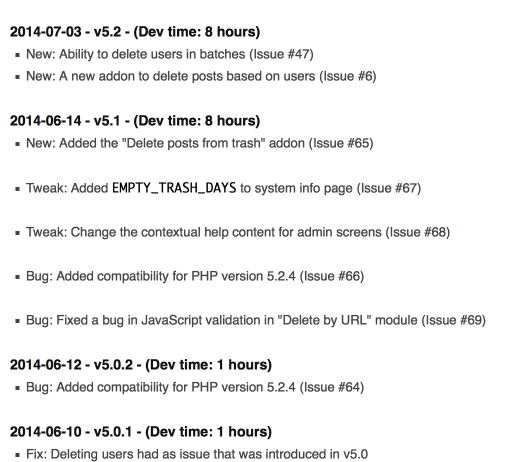Jean Galea, who is a member of the Advanced WordPress group on Facebook, recently shared a plugin with an interesting changelog. It’s called Bulk Delete and is developed by Sudar Muthu, a developer based in Bangalore, India. The changelog not only shows which bugs have been fixed or features that were added, it also displays the amount of time spent on each release.

Due to some personal things going in his life, Muthu began to track how much time he was investing in his side projects. “This happened because I got married and suddenly the amount of free time that I used to have in my life started to dry up. I wanted to find out which pet projects are taking up the majority of my free time,” Muthu Told the Tavern. In April of 2012, he wrote about the initiative and started adding the metrics to the changelog of Bulk Delete.

Some plugin authors have funded development of their plugin by having users pay for specific features. Muthu doesn’t get paid to work on Bulk Delete but he has started to sell commercial addons for it.
A Different Approach to Getting Free Support
One of the things Muthu has noticed is how users approach him to receive free support. “After I started adding the amount of time I am spending on different plugins in the changelog, the way people interact in the support forum seems to have changed a bit. I felt that they were able to understand the amount of time I am investing in developing and supporting a free plugin,” Muthu said.
I asked if he thinks this is something other plugin authors should consider implementing. “Each developer has their own preference but I guess if possible, I would like plugin authors to do this. It seems people like it and it will also let people know how much time an author spends in developing and maintaining a free plugin,” Muthu said.
I Think It’s a Great Idea
As someone who investigates the changelog for every plugin update, I’ve seen my share of them. However, I’ve yet to see one that is as detailed and informative as Bulk Delete. Showing the amount of time each version takes to develop gives users a perspective of the time and effort required to maintain a plugin. We generally hear how much time is involved, but rarely get to see how much.
Would you like to see this type of information added to the changelog of more plugins? Will seeing the amount of time change the way you approach the author to receive support? Sound off in the comments.
I’m not sure how I’d even go about tracking such a stat. It might take me 10 minutes to code something, but I’ll often be thinking about it off and on to come up with solutions at all hours of the day. Plus, I maintain I don’t know how many plugins/themes. Sometimes, 3 hours of work for one project will result in 5 minutes of work on another project that uses some of the same code. I also often jump from project to project while I’m working. I don’t see it as a realistic stat I could track.